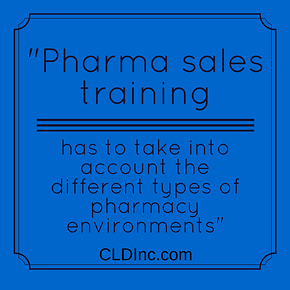
Pharma sales training has to take into account the different types of pharmacy environments reps will call upon in their work and properly prepare these professionals to develop the strong relationships that lead to long term success.
Retail Pharmacies
Retail pharmacies are the ones that most consumers are familiar with since most people have done business with a neighborhood or chain pharmacy like Walgreens. The retail pharmacy generally stocks many more prescription drugs than the typical hospital pharmacy. That’s because they want to be sure they carry the many medications on private insurance company formularies for all the insurers whose customers they serve.
Retail pharmacists interact with patients frequently and often act in an advisory capacity. Pharma sales training for retail pharmacies should understand the dynamics of the retail pharmacy, and how many are moving into a medication therapy management role, particularly since the introduction of the Medicare Part D benefit. The successful pharma rep understands how the retail pharmacist’s role is evolving and tailors education about medications to benefit a more public-facing setting.
Hospital Pharmacies
Hospitals may have both inpatient and outpatient pharmacies. Outpatient hospital pharmacies provide direct service to patients but are located in a hospital setting. Inpatient hospital pharmacies stock medications and also prepare injectables and custom medications for patients who are admitted as inpatients. The doctors and nurses in hospitals often communicate directly with hospital pharmacists, and interaction between these pharmacists and patients is typically limited, though some hospital pharmacists participate in patient rounds.
Generally, hospital pharmacists work with different medications than retail pharmacists, and pharma sales training must ensure that reps know the differences. Often, the drug rep calls on hospital pharmacists, who evaluate drugs and present information to physicians. Then, if clinicians express interest, pharmacists may ask for samples. Hospital pharmacists often require a high level of detailing expertise from pharma reps, due to their more intense, immediate clinical focus compared to retail pharmacists.
Compounding and Homecare Pharmacies
Compounding pharmacists prepare drugs in custom forms. Many of them dispense ready-made drugs as well. The compounding pharmacist may take an active role in the review of medication regimens, particularly in cases of elderly patients outside of institutional settings who nonetheless require numerous medications. Homecare pharmacists do work similar to compounding pharmacists, but often concentrate on home infusion therapy, preparing injectables that are delivered at home to seriously ill patients.
Pharma sales training for reps who work with compounding or home care pharmacies must emphasize the highly specific nature of the work of these pharmacists as well as highly detailed information that is necessary to pharmacists who are often helping treat seriously ill patients.
Pharmaceutical sales reps operate not only in health care provider settings but also in pharmacy settings, particularly as more independent doctors are hired by health care corporations where formulary decisions are made by committee or by a formulary management team. Pharmacies can differ greatly in terms of services provided and level of interaction with physicians and with patients. Pharma sales training has to prepare reps for the many different pharmacy settings they’re likely to encounter so they’ll know which detailing techniques are most appropriate in each situation.
For more than 35 years, CLD, Inc. has provided clients with customized pharma sales training tools. Using tailored combinations of technology and creativity backed by extensive experience, CLD is ready to help pharmaceutical trainers develop the most effective programs available. To learn more about how CLD can help you develop the right pharma sales training program for your needs, we invite you to contact us at any time. We would be happy to answer all your questions.




